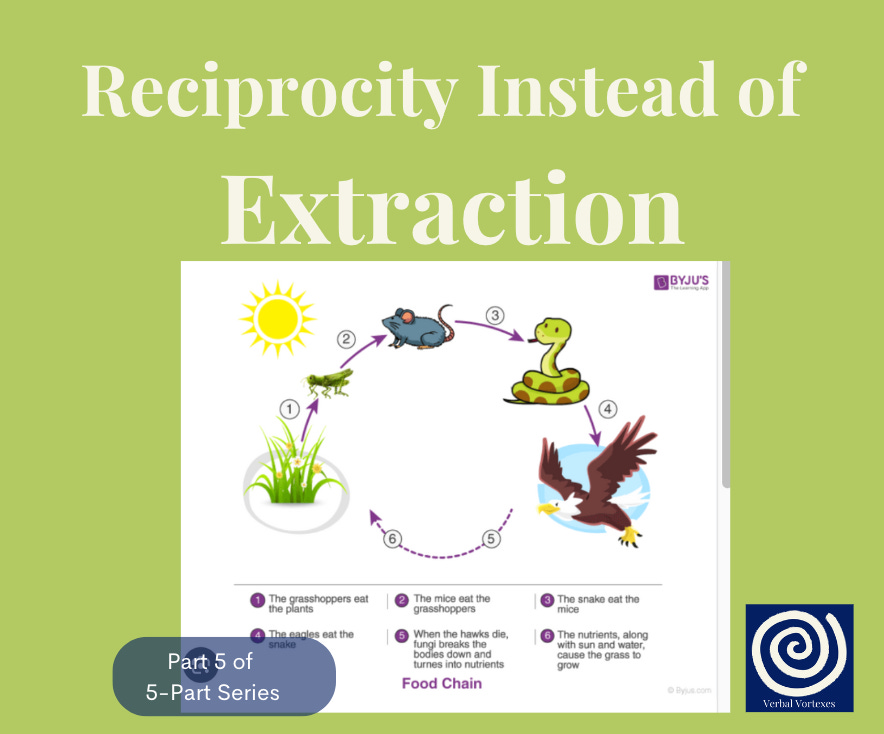Restoring the Balance: Lessons from Indigenous Wisdom - #5 of the Extractive Series
Reclaiming Harmony Through an Indigenous Lens
In the earlier sections of this series (1, 2, 3), we explored the foundational concepts of extraction and balance, delving into how the Indigenous Circle offers a framework for harmony. We examined the deep consequences of extractive thinking, tracing its impact across environmental, social, and cultural spheres, and revealed how these practices perpetuate harm and inequity.
Most recently, in Part 4, we turned our focus to leadership, uncovering how extractive thinking shapes decisions in ways that prioritize short-term gain over sustainability, equity, and collective well-being. From the corridors of corporate power to grassroots initiatives, we saw how this mindset depletes resources, fractures relationships, and undermines trust.
Now, in this section, we shift our lens toward solutions. Restoring the Balance: Lessons From Indigenous Wisdom offers a pathway to reimagine leadership. Drawing from centuries-old knowledge systems, this piece highlights practices that prioritize reciprocity, stewardship, and shared power. Through these lessons, we’ll explore actionable steps to create leadership models rooted in care, sustainability, and long-term vision.
Let’s uncover how Indigenous wisdom can guide us in dismantling extractive frameworks and building systems that honor balance, interconnectedness, and the shared humanity of all.
Purpose:
To showcase how Indigenous knowledge systems offer alternative approaches to leadership, rooted in sustainability, reciprocity, and interconnectedness, in direct opposition to extractive thinking. This chapter not only highlights these concepts but also empowers founding members with a framework for self-reflection to transform awareness into meaningful action.
1. Reciprocity Over Exploitation
Reciprocity is a foundational principle of Indigenous knowledge systems, emphasizing mutual exchange and care. In contrast to extractive leadership, which prioritizes “taking” without giving back, reciprocity challenges us to consider the impact of our actions on the collective well-being.
Concept: In many Indigenous cultures, relationships with land, community, and even future generations are guided by reciprocity—a cycle of giving and receiving that ensures sustainability and balance.
Example:
The Potlatch (a ceremonial practice among Indigenous peoples of the Pacific Northwest) reflects how wealth is shared, redistributed, and used to strengthen relationships, rather than accumulated for individual power.
Gifting economies remind us that abundance comes from collective sharing, not hoarding.
Reflection Questions for Founding Members: (great reminder of the DIY coaching you receive as members)
Where in my leadership or organization do I see an imbalance between giving and taking?
What resources (time, wealth, skills, recognition) can I redistribute to foster greater balance and reciprocity?
How do I ensure my success contributes to the success of my team, community, and future generations?
NOTE- finding an image that shows the accurate and full cycle with humans is difficult because people still think of themselves as separate and the exception.
(you can learn more from originator of the shared image above)
2. Leadership as Stewardship
Indigenous leadership is not rooted in dominance or control but in stewardship—a responsibility to care for people, land, and future generations. Leaders are caretakers, not rulers, understanding that leadership is a gift bestowed by the community, not an entitlement.
Key Quote/Concept: “We do not inherit the Earth from our ancestors; we borrow it from our children.”
This timeless wisdom calls us to consider the long-term consequences of our decisions. Leadership is about protecting resources, opportunities, and relationships so that future generations can thrive.
Application to Leadership:
Leaders must ask: What am I leaving behind? Does my leadership extract or replenish? Stewardship prioritizes decisions that preserve relationships, resources, and dignity for those who follow.
Keep reading with a 7-day free trial
Subscribe to Leadership Revealed by Verbal Vortexes to keep reading this post and get 7 days of free access to the full post archives.





